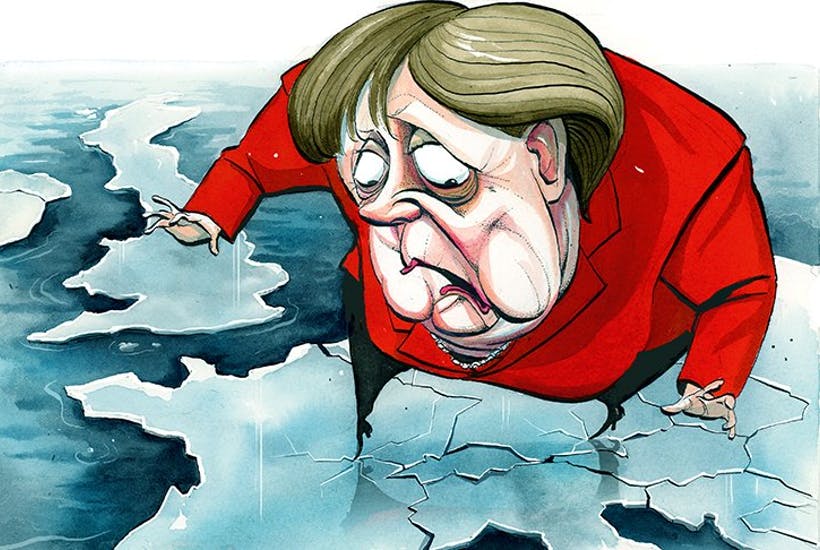Oh dear. More than three months since Germans went to the polls, and gave the CDU-SPD government a bloody nose, its politicians have finally emerged from the latest coalition talks – and the result is yet another cosy alliance between the CDU and the SPD. You’ve got to feel for German voters. In the Fatherland it seems no matter who you vote for, the so-called ‘grand coalition’ of Christian Democrats and Social Democrats almost always wins.
It wasn’t meant to be this way. In September’s election the CDU and SPD both recorded their worst result since the Second World War – 33 percent for the CDU (down nearly 9 percent) and 20.5 percent for the SPD (down by more than 5 percent). After that bruising verdict, SPD leader Martin Schulz said he wouldn’t enter another grand coalition with Angela Merkel’s Christian Democrats, yet here they are again, together again – Germany’s Tweedledum and Tweedledee.
The reason for Schulz’s change of heart was the breakdown of the previous coalition talks, between Merkel’s CDU, the Free Democrats and the Greens. This ‘Jamaica Alliance’ (after the colours of the three parties, black, yellow and green – the colours of the Jamaican flag) looked like the best bet for Germany, but it was scuppered when Christian Lindner, leader of the Free Democrats, walked out, citing a ‘lack of trust’ between the parties.
This breakdown left the Bundestag with three equally unappealing options – a minority CDU government, another election or another CDU-SPD coalition. At first it looked like Merkel might be willing to risk another election, but apparently German President Frank-Walter Steinmeier wasn’t so keen. The voters had spoken, he said, and now the politicians had to make the best of it. Yet despite the drubbing both big parties received, at the expense of smaller parties, it seems the best they can come up with is more of the same.
German journalists are reporting this ‘breakthrough’ as a modest victory for the centre-right. At first glance, it does look like the right wing of the CDU have got the better deal, while the left wing of the SPD have achieved little of what they wanted. There are tougher rules for immigrants, and no tax hikes. The SPD’s health insurance reforms have fallen by the wayside. Only on arms exports and pesticides can the Social Democrats claim victory. A period in opposition would have allowed them time and space to re-establish a distinct identity. Instead, they’re merely back in harness with Merkel’s CDU.
Yet in the long term, another grand coalition is just as damaging for the CDU. For now, they’re still Germany’s biggest party, but for how much longer? If they lose another 9 percent at the next election, the party will be in freefall, and its longstanding partnership with Bavaria’s Christian Social Union will be under threat. Since the Second World War, the CSU has been a bulwark against right wing extremism – a respectable conservative party that traditionalists could vote for. Yet in September’s election, they were outflanked by Alternative für Deutschland, Germany’s new anti-immigration party.
AfD did best in Eastern Germany, but they also performed well in Bavaria. The CDU must move to the right to preserve its crucial partnership with the CSU, and it’ll find this hard to do so long as it remains shackled to the SPD. The best hope for the CDU and the SPD is that they can build their way out of trouble. The two parties have promised to build 1.5 million new apartments by 2022.
It’s still unclear why Christian Linder walked out of those ‘Jamaican’ coalition talks, but it now looks like a dreadful error – not just for his party, but for Germany as a whole. His Free Democrats are free marketeers, with some bold ideas for re-energising the German economy, and embracing the digital age. Their business-friendly approach was just what the Bundesrepublik needed, a shot in the arm for Merkel’s statist CDU. Instead, thanks to Lindner’s walk-out, his FDP is just another opposition party, with less seats than AfD.
Lindner’s walk-out was also a grievous blow for Germany’s Green Party, who’ve proved themselves to be competent coalition partners, on a regional and national level. Widely mocked when they first entered the Bundestag, way back in the 1980s, their radical environmental ideals have now become mainstream. They remain the most dynamic voice on the left wing of German politics, far more creative and innovative than the SPD. Lindner’s walk-out was a gamble that backfired. Like so many gamblers, he overplayed his hand. A fresh election could have given his FDP a big breakthrough, but like a lot of German politicians (and pundits) before him, he underestimated Merkel’s staying power, and the SPD’s appetite for power – at almost any price.






Comments